新目标初二上册_英语语法知识点精讲 练习
(新版)新目标英语八年级上册Unit03语法知识点

Unit 3 I’m more outgoing than my sister.Section A (1a —Grammar Focus)● 1.“Is this/that …?”用于交际场合,尤其是互相介绍和询问时,this和that指“这位”“那位”或“这个人”“那个人”。
—Is this Miss Wang?—Yes, it is.2. this/that还用于电话用语中,在打电话时问“你是……吗?”用“Is that …?”,回答“我是……”用“This is…(speaking).”—Is that Li Lei?—No, this is Li Ping (speaking).●Sam has longer hair than Tom = Sam’s hair is longer than Tom’s(=Tom’s hair,不能用Tom,只能同类事物相比较).● 1. Both…and…“……两者都”,连接名词或代词作主语,其后的谓语动词用复数形式,其否定形式可为“neither…nor…”。
Both you and I are in Class Five.否定形式:Both you and I aren’t in Class Five. 我和你不都在5班。
(不完全否定)Neither you nor I am (就近原则) in Class Five. 我和你都不在5班。
(完全否定)2. pron./adv. both(两者)否定为:neither(两者中)任何一个不all(三者或三者以上)否定为:none(三者或三者以上)没有人或没有物。
All of them are English. = They are all English. 他们都是英国人。
否定:None of them is (are) English. 他们都不是英国人。
Both of them are doctors. = They are both doctors. 他们俩都是医生。
人教新目标英语八年级上册Unit-4重难点总结+练习题(含答案)
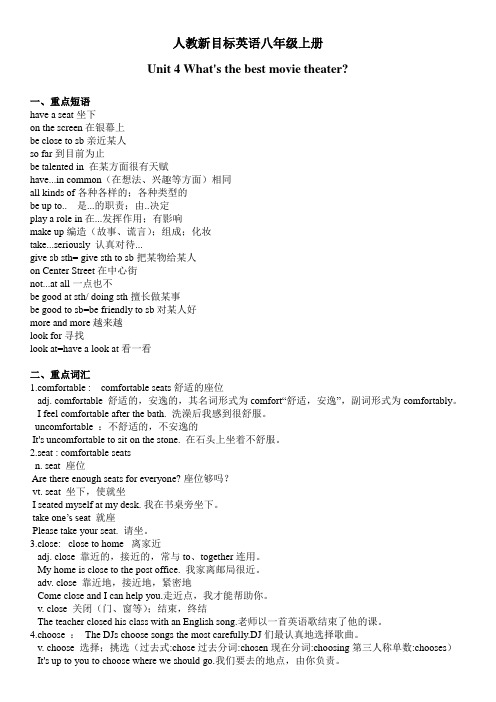
人教新目标英语八年级上册Unit 4 What's the best movie theater?一、重点短语have a seat坐下on the screen在银幕上be close to sb亲近某人so far到目前为止be talented in 在某方面很有天赋have...in common(在想法、兴趣等方面)相同all kinds of各种各样的;各种类型的be up to.. 是...的职责;由..决定play a role in在...发挥作用;有影响make up编造(故事、谎言);组成;化妆take...seriously 认真对待...give sb sth= give sth to sb把某物给某人on Center Street在中心街not...at all一点也不be good at sth/ doing sth擅长做某事be good to sb=be friendly to sb对某人好more and more越来越look for寻找look at=have a look at看一看二、重点词汇fortable : comfortable seats舒适的座位adj. comfortable 舒适的,安逸的,其名词形式为comfort“舒适,安逸”,副词形式为comfortably。
I feel comfortable after the bath. 洗澡后我感到很舒服。
uncomfortable :不舒适的,不安逸的It's uncomfortable to sit on the stone. 在石头上坐着不舒服。
2.seat : comfortable seatsn. seat 座位Are there enough seats for everyone? 座位够吗?vt. seat 坐下,使就坐I seated myself at my desk. 我在书桌旁坐下。
八年级英语上册Unit 6知识点及练习题(新版新目标)

八年级英语上册Unit 6知识点及练习题(新版新目标)Unit6I’mgoingtostudycomputerscience.一,语法:begoingto的用法“begoingto+动词原形”表示将来的打算、计划或安排。
常与表示将来的tomorrow,nextyear等时间状语或when引导的时间状语从句连用。
其各种句式变化借助be助动词完成。
be随主语有is,am,are的变化,goingto后接动词原形。
当堂检测一、用begoingto的适当形式填空.—what____________you____________tomorrow?—I____________Unclewang.2.LiLeiandjim____________footballgamethedayafterto morrow.3.____________they____________fishingnextSaturday?4.There____________abirthdaypartythisevening.5.—Listen!what________they__________?—They____________songs.—Thenwhat____________they____________thisafternoon?—They____________somethingformrLi.6.what_______you_________nextFriday?7.where________they_________somefruit?8.LinTao_________________japanesenextterm.二.单项选择1.Thetrain______________infiveminutes.A.isgoingtogoB.isgoingc.willgoingD.goes2.—whereisjimgoingtomove?He’sgoingto______________Newyork.A.movedtoB.movedc.moveD.moveto3.—There___________aconcertthisevening.—yeah.Excitingnews!A.aregoingtobeB.isgoingtobec.isgoingtohaveD.willhave4..Ihaveadream.whenI___________,Iwanttobeascientist.A.makeupB.comeupc.growupD.turnup5.Iwanttomoveto___________.A.interestingsomewhereB.somewhereinterestingc.interestingwhereD.whereinteresting二、句型转换。
人教新目标八上英语 Unit 1 Section A知识点和练习
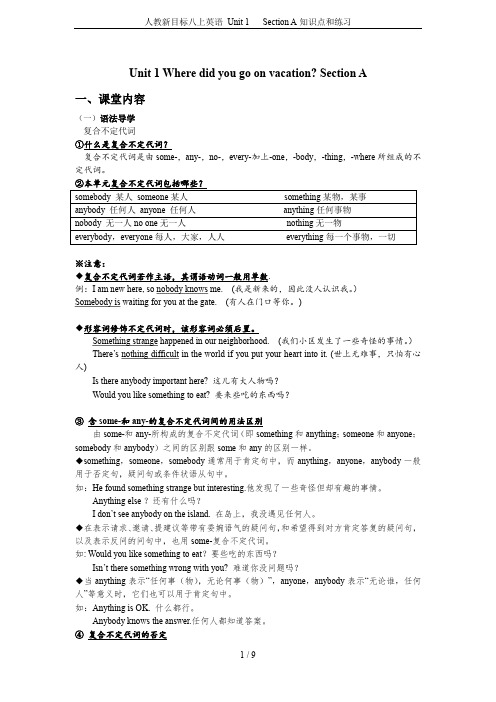
Unit 1 Where did you go on vacation? Section A一、课堂内容(一)语法导学复合不定代词①什么是复合不定代词?复合不定代词是由some-,any-,no-,every-加上-one,-body,-thing,-where所组成的不定代词。
※注意:◆复合不定代词若作主语,其谓语动词一般用单数.例:I am new here, so nobody knows me. (我是新来的,因此没人认识我。
)Somebody is waiting for you at the gate. (有人在门口等你。
)◆形容词修饰不定代词时,该形容词必须后置。
Something strange happened in our neighborhood. (我们小区发生了一些奇怪的事情。
)There’s nothing difficult in the world if you put your heart into it. (世上无难事,只怕有心人)Is there anybody important here? 这儿有大人物吗?Would you like something to eat? 要来些吃的东西吗?③含some-和any-的复合不定代词间的用法区别由some-和any-所构成的复合不定代词(即something和anything;someone和anyone;somebody和anybody)之间的区别跟some和any的区别一样。
◆something,someone,somebody通常用于肯定句中,而anything,anyone,anybody一般用于否定句,疑问句或条件状语从句中。
如:He found something strange but interesting.他发现了一些奇怪但却有趣的事情。
Anything else ?还有什么吗?I don’t see anybody on the island. 在岛上,我没遇见任何人。
新目标八年级上册_英语语法知识点精讲+练习
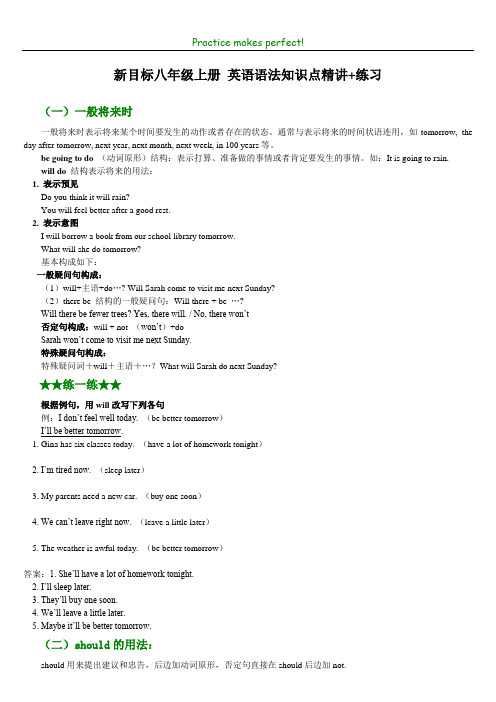
新目标八年级上册英语语法知识点精讲+练习(一)一般将来时一般将来时表示将来某个时间要发生的动作或者存在的状态。
通常与表示将来的时间状语连用,如tomorrow, the day after tomorrow, next year, next month, next week, in 100 years等。
be going to do(动词原形)结构:表示打算、准备做的事情或者肯定要发生的事情。
如:It is going to rain.will do结构表示将来的用法:1. 表示预见Do you think it will rain?You will feel better after a good rest.2. 表示意图I will borrow a book from our school library tomorrow.What will she do tomorrow?基本构成如下:一般疑问句构成:(1)will+主语+do…? Will Sarah come to visit me next Sunday?(2)there be 结构的一般疑问句:Will there + be …?Will there be fewer trees? Yes, there will. / No, there won’t否定句构成:will + not (won’t)+doSarah won’t come to visit me next Sunday.特殊疑问句构成:特殊疑问词+will+主语+…?What will Sarah do next Sunday?★★练一练★★根据例句,用will改写下列各句例:I don’t feel well today. (be better tomorrow)I’ll be better tomorrow.1. Gina has six classes today. (have a lot of homework tonight)_____________________________2. I’m tired now. (sleep later)_____________________________3. My parents need a new car. (buy one soon)_____________________________4. We can’t leave right now. (leave a little later)_____________________________5. The weather is awful today. (be better tomorrow)_____________________________答案:1. She’ll have a lot of homework tonight.2. I’ll sleep later.3. They’ll buy one soon.4. We’ll leave a little later.5. Maybe it’ll be better tomorrow.(二)should的用法:should用来提出建议和忠告,后边加动词原形,否定句直接在should后边加not.例如:I think you should eat less junk food.我认为你应该少吃垃圾食品。
人教新目标英语八年级上册Unit10重难点知识讲解+练习题(无答案)
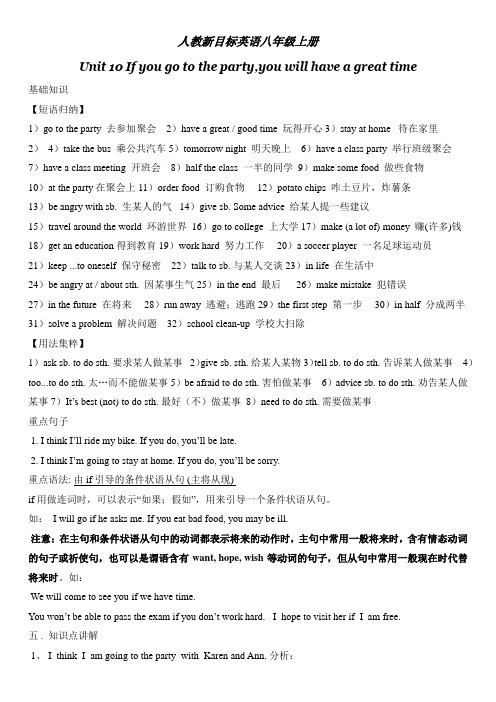
人教新目标英语八年级上册Unit 10 If you go to the party,you will have a great time基础知识【短语归纳】1)go to the party 去参加聚会 2)have a great / good time 玩得开心 3)stay at home 待在家里2) 4)take the bus 乘公共汽车 5)tomorrow night 明天晚上 6)have a class party 举行班级聚会7)have a class meeting 开班会 8)half the class 一半的同学 9)make some food 做些食物10)at the party 在聚会上 11)order food 订购食物 12)potato chips 咋土豆片,炸薯条13)be angry with sb. 生某人的气 14)give sb. Some advice 给某人提一些建议15)travel around the world 环游世界 16)go to college 上大学 17)make (a lot of) money 赚(许多)钱18)get an education 得到教育 19)work hard 努力工作 20)a soccer player 一名足球运动员21)keep ...to oneself 保守秘密 22)talk to sb. 与某人交谈 23)in life 在生活中24)be angry at / about sth. 因某事生气 25)in the end 最后 26)make mistake 犯错误27)in the future 在将来 28)run away 逃避;逃跑 29)the first step 第一步 30)in half 分成两半31)solve a problem 解决问题 32)school clean-up 学校大扫除【用法集粹】1)ask sb. to do sth. 要求某人做某事 2)give sb. sth. 给某人某物 3)tell sb. to do sth. 告诉某人做某事 4)too...to do sth. 太…而不能做某事 5)be afraid to do sth. 害怕做某事 6)advice sb. to do sth. 劝告某人做某事 7)It’s best (not) to do sth. 最好(不)做某事 8)need to do sth. 需要做某事重点句子1. I think I’ll ride my bike. If you do, you’ll be late.2. I think I’m going to stay at home. If you do, you’ll be sorry.重点语法: 由 if 引导的条件状语从句 (主将从现)if 用做连词时,可以表示“如果;假如”,用来引导一个条件状语从句。
人教版新目标八年级上册-英语语法知识点
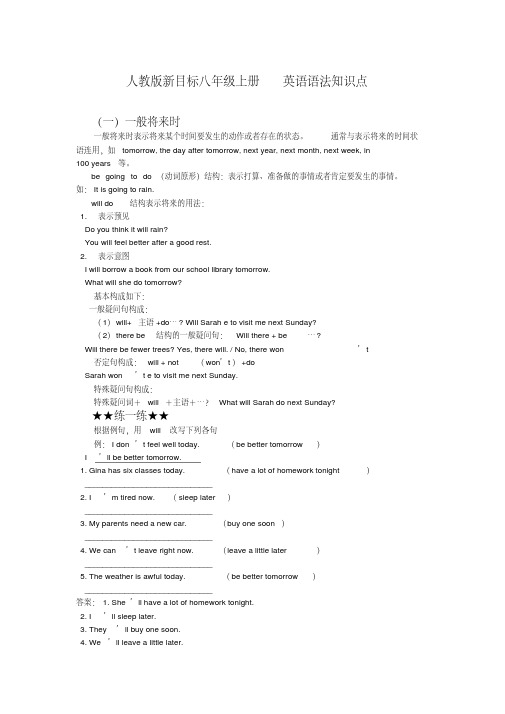
人教版新目标八年级上册英语语法知识点(一)一般将来时一般将来时表示将来某个时间要发生的动作或者存在的状态。
通常与表示将来的时间状语连用,如tomorrow, the day after tomorrow, next year, next month, next week, in100 years等。
be going to do(动词原形)结构:表示打算、准备做的事情或者肯定要发生的事情。
如:It is going to rain.will do结构表示将来的用法:1. 表示预见Do you think it will rain?You will feel better after a good rest.2. 表示意图I will borrow a book from our school library tomorrow.What will she do tomorrow?基本构成如下:一般疑问句构成:(1)will+主语+do…? Will Sarah e to visit me next Sunday?(2)there be 结构的一般疑问句:Will there + be …?Will there be fewer trees? Yes, there will. / No, there won’t 否定句构成:will + not (won’t)+doSarah won’t e to visit me next Sunday.特殊疑问句构成:特殊疑问词+will+主语+…?What will Sarah do next Sunday?★★练一练★★根据例句,用will改写下列各句例:I don’t feel well today. (be better tomorrow)I’ll be better tomorrow.1. Gina has six classes today. (have a lot of homework tonight)_____________________________2. I’m tired now. (sleep later)_____________________________3. My parents need a new car. (buy one soon)_____________________________4. We can’t leave right now. (leave a little later)_____________________________5. The weather is awful today. (be better tomorrow)_____________________________答案:1. She’ll have a lot of homework tonight.2. I’ll sleep later.3. They’ll buy one soon.4. We’ll leave a little later.5. Maybe it’ll be better tomorrow.(二)should的用法:should用来提出建议和忠告,后边加动词原形,否定句直接在should后边加not.例如:I think you should eat less junk food.我认为你应该少吃垃圾食品。
人教新目标版八年级英语上册Unit3语法、知识点归纳及训练
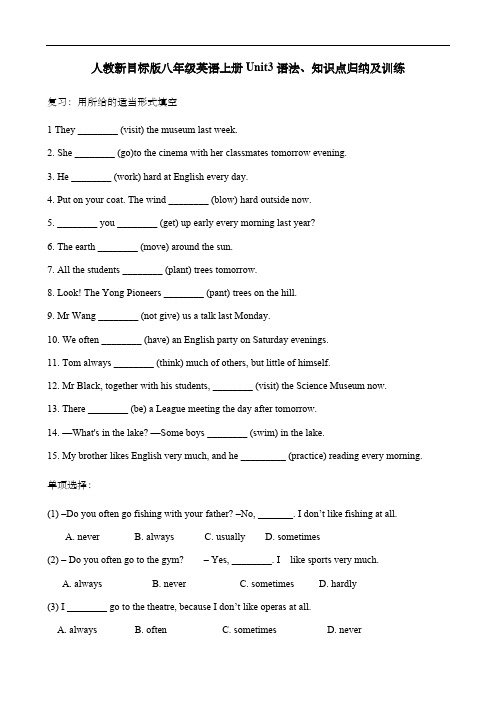
人教新目标版八年级英语上册Unit3语法、知识点归纳及训练复习:用所给的适当形式填空1 They ________ (visit) the museum last week.2. She ________ (go)to the cinema with her classmates tomorrow evening.3. He ________ (work) hard at English every day.4. Put on your coat. The wind ________ (blow) hard outside now.5. ________ you ________ (get) up early every morning last year?6. The earth ________ (move) around the sun.7. All the students ________ (plant) trees tomorrow.8. Look! The Yong Pioneers ________ (pant) trees on the hill.9. Mr Wang ________ (not give) us a talk last Monday.10. We often ________ (have) an English party on Saturday evenings.11. Tom always ________ (think) much of others, but little of himself.12. Mr Black, together with his students, ________ (visit) the Science Museum now.13. There ________ (be) a League meeting the day after tomorrow.14. —What's in the lake? —Some boys ________ (swim) in the lake.15. My brother likes English very much, and he _________ (practice) reading every morning.单项选择:(1) –Do you often go fishing with your father? –No, _______. I don’t like fishing at all.A. neverB. alwaysC. usuallyD. sometimes(2) – Do you often go to the gym? – Yes, ________. I like sports very much.A. alwaysB. neverC. sometimesD. hardly(3) I ________ go to the theatre, because I don’t like operas at all.A. alwaysB. oftenC. sometimesD. never(4) He says he will come to see us tomorrow afternoon.A. sometimeB. some timeC. sometimesD. some times(5) Speak aloud, please! I can _____ hear you.A. almostB. hardlyC. usuallyD. sometimes(6) My cousin wants to keep slim. She does exercise every morning and __ eats meat.A. hardlyB. alwaysC. usuallyD. often(7) —Miss Zhou is very popular with the students.—Yes. Her classes are_________ lively and interesting.A. alwaysB. sometimesC. hardlyD. never(8) —Have you ever been to Disneyland?—No, ______.I hope I can go there next year.A. alwaysB. sometimesC. neverD. often(9) —Zhang Lili, "the most beautiful teacher", has moved us deeply.—Yes, and she is__________ popular with her students.A. sometimesB. neverC. alwaysD. hardly(10) I don’t think fast food is good for our health, so I _______ go to MacDonald.A. hardlyB. alwaysC. usuallyD. often语法学习:形容词是用来修饰名词或不定代词,说明事物和人的性质和特征的一类词,在句子中用作定语、表语、宾语补足语;而副词用以修饰动词、形容词或其他副词,在句子中作状语、表语、补语和定语。
- 1、下载文档前请自行甄别文档内容的完整性,平台不提供额外的编辑、内容补充、找答案等附加服务。
- 2、"仅部分预览"的文档,不可在线预览部分如存在完整性等问题,可反馈申请退款(可完整预览的文档不适用该条件!)。
- 3、如文档侵犯您的权益,请联系客服反馈,我们会尽快为您处理(人工客服工作时间:9:00-18:30)。
新目标八年级上册英语语法知识点精讲+练习(一)一般将来时一般将来时表示将来某个时间要发生的动作或者存在的状态。
通常与表示将来的时间状语连用,如tomorrow, the day after tomorrow, next year, next month, next week, in 100 years等。
be going to do(动词原形)结构:表示打算、准备做的事情或者肯定要发生的事情。
如:It is going to rain.will do结构表示将来的用法:1. 表示预见Do you think it will rain?You will feel better after a good rest.2. 表示意图I will borrow a book from our school library tomorrow.What will she do tomorrow?基本构成如下:一般疑问句构成:(1)will+主语+do…? Will Sarah come to visit me next Sunday?(2)there be 结构的一般疑问句:Will there + be …?Will there be fewer trees? Yes, there will. / No, there won’t否定句构成:will + not (won’t)+doSarah won’t come to visit me next Sunday.特殊疑问句构成:特殊疑问词+will+主语+…?What will Sarah do next Sunday?★★练一练★★根据例句,用will改写下列各句例:I don’t feel well today. (be better tomorrow)I’ll be better tomorrow.1. Gina has six classes today. (have a lot of homework tonight)_____________________________2. I’m tired now. (sleep later)_____________________________3. My parents need a new car. (buy one soon)_____________________________4. We can’t leave right now. (leave a little later)_____________________________5. The weather is awful today. (be better tomorrow)_____________________________答案:1. She’ll have a lot of homework tonight.2. I’ll sleep later.3. They’ll buy one soon.4. We’ll leave a little later.5. Maybe it’ll be better tomorrow.(二)should的用法:should用来提出建议和忠告,后边加动词原形,否定句直接在should后边加not.例如:I think you should eat less junk food.我认为你应该少吃垃圾食品。
She drives a lot and she seldom walks. So I think she should walk a lot.她经常开车,很少走路。
所以我认为她应该多走路。
Students shouldn’t spend too much time playing computer games.学生们不应当花太多的时间玩计算机游戏。
学习向别人提建议的几种句式:(1)I think you should…(2)Well, you could…(3)Maybe you should …(4)Why don’t you…?(5)What about doing sth.?(6)You’d better do sth.★★练一练★★用should或shouldn’t填空1. I can’t sleep the nig ht before exams.You ______ take a warm shower before you go to bed.2. Good friends ______ argue each other.3. There is little milk in the glass. We _______ buy some.4. They didn’t invite you? Maybe you ______ be friendlier.5. I am a little bit overweight. So I think I _______ do exercises every day.答案:1. should 2. shouldn’t 3. should 4. should 5. should(三)过去进行时过去进行时表示过去某一点时间正在进行的动作或者过去某一段时间内一直进行的动作。
1. 构成was /were + doing,例如:I was watching TV at 9 o’clock last night.at 9 o’clock last night是时间点They were playing football all afternoon.all afternoon是时间段2. 过去进行时的标志词at 8 o’clock last night, this time yesterday等。
例如:I was having lunch at home this time yesterday.昨天的这个时候我正在吃午饭。
At that time she was writing a book.那阵子她在写一本书。
(表示她在那段时间里一直在做那件事情。
)★★练一练★★用括号中所给动词的适当形式填空。
1. This time yesterday I ____ ______(read)books.2. At 9 o’clock last Sunday they ______ ______(have)a party.3. When I _____(come)into the classroom, she ________ ______(read)a storybook.4. She _____ ______(play)computer games while her mother ____ ______(cook)yesterday afternoon.5. I _____ ______(have)a shower when you _______(call)me yesterday.答案:1. was reading 2. were having 3. came; was reading4. was playing; was cooking5. was having; called(四)间接引语形成步骤:(1)不要逗号,冒号,引号(2)要考虑到人称的变化(人称的变化与汉语是一致的)(3)要考虑时态的变化(4)要考虑时间状语、地点状语和语示代词的变化。
1.2.★★练一练★★用括号中所给动词的适当形式填空。
1. She said I _____(be)hard-working.2. Peter told me he _____(be)bored yesterday.3. She said she _____(go)swimming last Sunday.4. Bobby said he _____(may)call me later.5. Antonio told me he _____(read)a book then.答案:1. was 2. was 3. went 4. might 5. was reading请转述他人说的话:1. I go to the beach every Saturday. (Tom)2. I can speak three languages. (Lucy)3. I will call you tomorrow. (Mike)4. I’m having a surprise party for Lana. (she)(五)if引导的条件状语从句结构:if+一般现在时,主语+将来时含义:如果……,将要……例如:If you ask him, he will help you.如果你请求他,他会帮助你。
If n eed be, we’ll work all night.如果需要,我们就干个通宵。
★★练一练★★根据中文提示,完成句子。
1. 如果你参加聚会,你将会过得很开心。
If you ________ the party, you __________.2. 如果明天下雨,我们将不去野餐。
If it __________ tomorrow, we ___________.3. 如果你经常听英文歌,你将会喜欢英语的。
If you often ________, you _________________.答案:1. If you go to the party, you will have a good time2. If it rains tomorrow, we won’t go to the picnic3. If you often listen to English songs, you’ll like English二. 完形填空特点及解题思路(一)题型分类与特点完形填空试题是在给出的一篇短文中有目的地拿掉若干个词,留下一些空格,要求考生借助短文保留的部分,从所给的短文整体出发,在正确理解短文意思的基础上,根据句子和句子间的内在联系、词的用法和习惯搭配等,用适当的词或词语填空,使补全后的短文意思通顺、前后连贯、结构完整。
这种题型测试的内容从形式上看是单词或短语的填空,但它必须注意到短文中上、下文意思连贯、词语搭配和语法结构正确,所以在空格上所填的词必须符合语义适用和语法正确两条原则,只考虑某一侧面都可能导致错误。
中考中完形填空试题的基本题型分两类:完形填空选择题和完形填空题。
1. 完形填空选择题:该题型的特点是将一篇短文中若干词语抽掉留下空格,对每一空格提供若干个选择项,要求考生通读短文后,在理解短文意思的基础上,运用所学的词汇、句型、语法等语言知识,从所提供的备选项中选出一个最佳答案,使短文内容完整正确。
